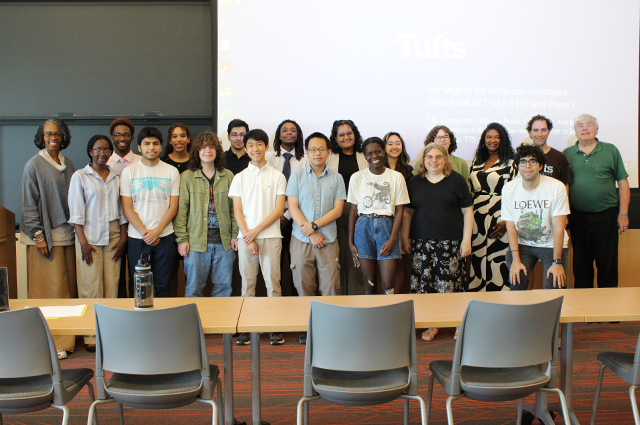Sharing data science research

This year the DIAMONDS (Directed, Intensive And Mentored Opportunities iN Data Science) REU Summer Research program welcomed its second cohort of students from around the country to engage in ten weeks of rigorous data science research. The program operates through the Center for STEM Diversity at Tufts University and is primarily funded via a National Science Foundation (NSF) Research Experiences for Undergraduates (REU) grant received by Tufts, in support of a culture of interdisciplinary research and learning in data sciences. In 2023, four students from the Tufts University School of Engineering participated in the DIAMONDS program alongside peers from Tufts School of Arts and Sciences and from institutions across the US.
Students are paired with Tufts faculty mentors to research problems in data science. Nasir Wynruit, E25, used deep learning to improve cancer detection methods. He combined mammogram images for more accurate results predicting malignant cells. Ann W. Lambertus and Peter Lambertus Assistant Professor Mike Hughes of the Department of Computer Science advised Wynruit’s work, which could lead to earlier detection, improved patient outcomes, and more informed decision making for patients with breast cancer. In the future, Wynruit hopes to expand and employ the method to detect other types of cancer.
Kevin Yu, E26, also tackled a topic related to human health. Mentored by Professor Lenore Cowen of the Department of Computer Science, and joined by Mia Taylor, A25, who was funded by NSF through the Tufts T-Tripods institute, the team worked together to find possible new genetic pathways in genetic interaction networks. The students used clustered modules to streamline the process without losing information and introduced an additional culling step to further refine their data. In addition to improving fundamental understanding of how different genes can compensate for each other to perform important cell functions, their method may eventually be able to suggest chemotherapy targets for personalized cancer treatments.
Ashley Jeon, E25, improved algorithms to model ice sheet thickness and elevation change over time. With support from Abani Patra, Stern Family Professor and Director of the Data Intensive Studies Center, Jeon explored two different search algorithms within a program known as Approximation by Localized Penalized Splines (ALPS). Improved methods of monitoring glaciers and ice sheets could be used to predict the rate of sea level rise, an increasingly important task as the negative effects of climate change continue to mount.
DIAMONDS also provides a unique opportunity for students from different universities to work together. Kelly Tsidji, E25, and McKenzie Skrastins (Binghamton University) developed a custom prediction algorithm to classify whether flavor molecules would taste sweet or bitter based only on their chemical structure. Supported by Cowen in their research, the duo gave an entertaining final presentation which culminated in using their algorithm to determine whether dark chocolate should be considered sweet or bitter. Moving forward, Tsidji and Skrastins hope to incorporate the shape and properties of human taste receptors into their prediction algorithm.
While most projects stayed within the digital realm, some students chose to implement components from the physical world in their research. With additional support from AccessComputing, Ethan Hsu, E25, studied the navigation techniques of social robots to glean best practices. Social robots range from assistive or mobility devices to robot vacuum cleaners, and all share a need to map and navigate their environment without bumping into obstacles. With mentorship from Clare Boothe Luce Assistant Professor Elaine Short, Hsu applied what he learned to build his own social robot and test its navigation skills. His work has implications for improving assistive technology and better integrating social robots into our lives.
This year’s final presentation also offered some non-DIAMONDS Tufts students a chance to present on their summer research. Chris Pelligrini, E24, shared his research with faculty mentor Assistant Professor Dan Votipka, of the Department of Computer Science, on testing how effective threat modeling tools were for medical devices.
As a hub for data science research, Tufts School of Engineering takes pride in cultivating the next generation of data workers. DIAMONDS provides undergraduate students with invaluable research experience and cultivates the skills they will need as they progress in their careers. DIAMONDS was co-founded in 2019 by Professor Lenore Cowen and by Ellise LaMotte, Associate Dean of Student Diversity, Inclusion, and Success as part of the Tufts T-Tripods institute in Data Science. In Summer 2022, it was successfully spun off as an independent NSF REU site, directed by Ellise LaMotte, and co-directed by Cowen and Grace Caldara, director of the Center for STEM Diversity.
The content of this article is solely the responsibility of the authors and does not necessarily represent the official views of the National Science Foundation. Research reported in this article was supported by the National Science Foundation, under award numbers 2149871 and 1934553.
Department:
Computer Science